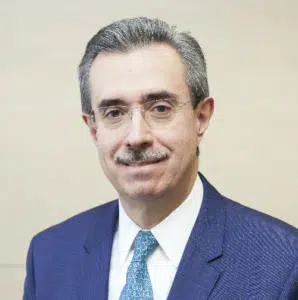Aguilera: “A crise produzida pela pandemia na América Latina significará avançar mais rapidamente em políticas públicas que conjurem uma nova década perdida”
O relatório América Latina, uma agenda de recuperação, elaborado pela Fundación Euroamérica e pela Fundación Iberoamericana Empresarial, com o apoio do Banco de Desenvolvimento da América Latina (CAF), apresenta uma lista de propostas para promover uma estratégia de recuperação econômica da região após a crise provocada pela COVID-19. Para acessar o relatório completo, clique aqui.
A pandemia de COVID-19 teve consequências inesperadas no mundo, e a América Latina é a região mais afetada pela crise e suas previsões de recuperação são lentas e frágeis. O Diretor Geral da MAPFRE Economics, Manuel Aguilera, participou ativamente da elaboração do relatório América Latina, uma agenda de recuperação.

Rebuilding trust and strategic alliances
In the online presentation of the report América Latina, una agenda para la recuperación to the DLAT (Delegation to the Euro-Latin American Parliamentary Assembly), Ramón Jáuregui, Chair of the Euroamerica Foundation and former Chair of DLAT, spoke of the “incredibly grave” situation in the region, which could lose a decade of progress in terms of macroeconomics, standards of living and poverty levels. This situation means that Europe must make itself present in Latin America.
He summarized the four major emergencies: vaccines, in terms of the worrying delays in distribution and “the risk of a moral failure on Europe’s part”; international funding and the responsibilities of international bodies such as the IMF in this regard; the inclusion of the region in the twin ecological and digital transition being promoted by the EU, involving commitments from the European Investment Bank and benefiting from the opportunities offered by this region’s society and its wealth of resources; and the need to establish a strategic alliance between Europe and Latin America. He acknowledged that Latin America’s political community was losing confidence in Europe and business investments were being withdrawn. In the global geopolitical sphere, Europe has no ally more loyal or natural, or with more common values, he asserted, so strengthening solidarity and alliances is a must. The Ibero-American space is a community built upon key multilateral consensus and, with this in mind, the report puts forward measures to ensure that Latin America is not left behind.
For his part, Josep Piqué, President of the Fundación Iberoamericana Empresarial and Spain’s former Minister of Foreign Affairs, said that the document had been well received, since “it is based on solidarity, multilateralism and cooperation” but did not use these to obscure the work that needs to be done internally by the Latin American region itself with regard to competitiveness and structural and governmental reform. In his view, the report has opened up a Euro-Latin American dialog, in the presence of leading experts, about the need for the EU to support the region in global forums and to align the priorities with those of the Portuguese Presidency of the Council of the European Union, with a focus on processing the EU-Mercosur agreement.
The document examines key issues such as the regional integration of Latin American markets, the financing of future investments in limited fiscal spaces and digitization in order to break the closed circuit of informality and the rigidity of the labor markets. The report also covers the need to create an appropriate legal framework, promote greater private investment and develop ecosystems, public policies and legal frameworks that facilitate social investment.
In the online presentation of the study last October to the SEGIB (Secretaría General Iberoamericana — Ibero-American General Secretariat), Escolano pointed out that it was important for Latin America to approach “the short-term with determination and the long-term with an open mind” and recalled that the report recommended reforms for competitiveness, resilience and economic sustainability.
Related aticles:
Latin American female leaders call for action to prevent equality setbacks

